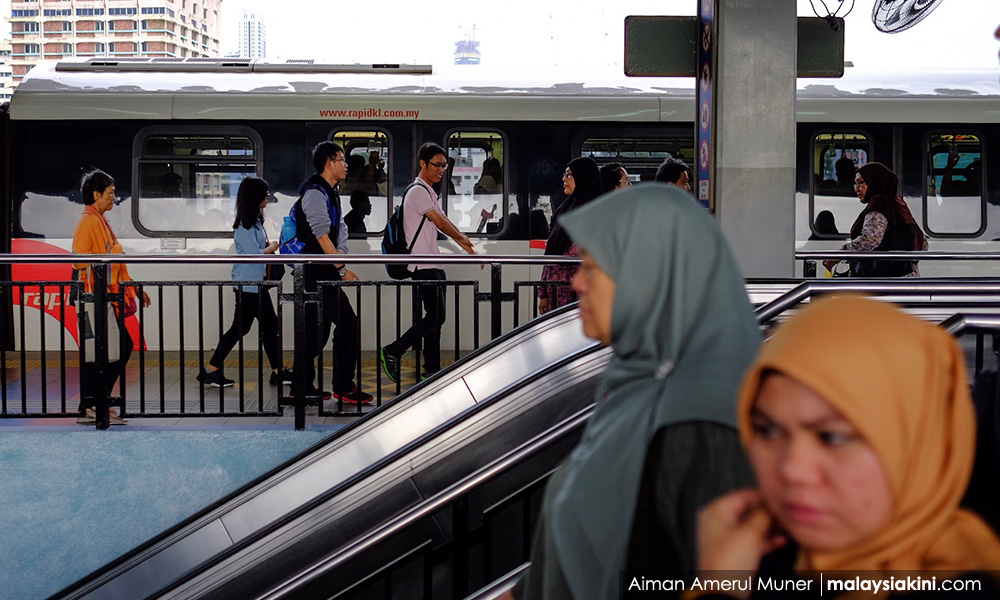Improving public transport services, preparing a more integrated public transport system and giving emphasis on road safety have always been the Ministry of Transport's top priorities in its plans and strategies to ensure the safety and wellbeing of the people.
Although improvement and reform efforts introduced by the ministry since Pakatan Harapan took over the administration of the country from BN are sometimes seen as unpopular measures, the ministry is determined to move forward to empowering the aspects of transport safety and services.
Citing an example of the usage of child car seats or child restraint system (CRS) in private vehicles, which would be made mandatory from January 2020, Minister Anthony Loke said the government stood firm in its decision despite the protests and negative reactions from certain quarters.
He stressed that the decision was never meant to trouble the parents, but vital to enhance public awareness on the importance of protecting the safety of the child as the failure of using the CRS has proven fatal for children in many road accidents.
“As the minister in charge of transport and road safety, I have to do this even though I’m being criticised for taking an unpopular measure, but I’m confident that this is the best move to ensure the safety of road users in the long run.
“We know many quarters have been protesting and complaining that the CRS is becoming a burden, that it is expensive and troublesome… we have anticipated this kind of feedback because every safety measure will take some time to be accepted and adopted by the people,” he told Bernama in a special interview recently.

Loke said it was the same case when the people questioned the rationality and importance of seat belts and helmets when the usage was made compulsory in the 1970s.
“Now, Malaysia has reached quite a high level of compliance in the usage of seat belts and helmets compared to other countries in the region. So, we know that it is normal for a new measure to receive negative feedback at the beginning,” he said.
The minister said although the usage of the CRS will be made mandatory from Jan 1 next year, no stern action or summons would be imposed on anyone for the first sixth months of the implementation as the period is meant to educate and familiarise the public with the new ruling.
“We want people to really know and understand that the CRS is for safety. That is why the soft-landing approach is taken for the first phase of the implementation. This is like an educational or advocacy stage before the enforcement phase takes effect,” he said.
On the price of child car seats, which was said to be costly, Loke said he believed that the price would drop when the supply becomes higher than demand once the new ruling is gazetted and enforced.
However, he said the government will not turn a blind eye and will help monitor the price of child car seats in the market.
In fact, he said the ministry had also discussed with the Ministry of Finance not to impose excise duty on child car seats so that the price could be reduced.
Moving forward, Loke said the ministry also hoped to continue to be able to provide and enhance people’s mobility, from land to air, in line with the National Transport Policy 2019-2030.
“We are responsible for the movement of goods and people, not just for providing transport for the people, but also in ensuring the effectiveness of the movement of goods as it also involves logistics for ports, airports and land transport.
“All those are part of a huge ecosystem, so we hope we will be able to create an environment that will facilitate the movement of goods. If we can do that efficiently, then the cost of transport for goods will be lower and it will be translated into price reduction which has a direct impact on the people’s cost of living,” he said.

In a bid to encourage people to use public transport, the government has also introduced the My100 travel pass which gives the holder unlimited access to Rapid KL-operated public transport in Klang Valley, including Rapid KL stage buses, LRT, monorail, MRT, MRT shuttle buses, as well as Sunway line Rapid Transit Bus.
Loke said the monthly pass, exclusively for the locals, was introduced as part of the government’s initiatives to alleviate the people’s burden from the rising cost of living and also to reduce traffic congestion in the city.
“We want people to be able to travel comfortably, conveniently and to have more time to spend with their families,” he said.
When asked about the ministry’s plans for 2020, Loke said:
“There are so many plans and initiatives that we want to take... we want to continue improving the public service delivery system, especially involving the Road Transport Department and the Land Public Transport Agency which deals with the people on a daily basis.”
The minister said reform is necessary to digitalise relevant public services so that the services can be offered online and hence, reduce waiting time and the usage of paper at the counter.
Loke, however, admitted that he was far from satisfied with the reform made so far and would want to see more positive changes and improvements in the transport industry.
“We cannot be easily satisfied because the effort to improve public transport services and systems is a continuous work... we know there are weaknesses that need to be improved, we want the people to see and feel satisfied with the improvement we made, including having cheap and efficient transport system,” he added.
- Bernama

